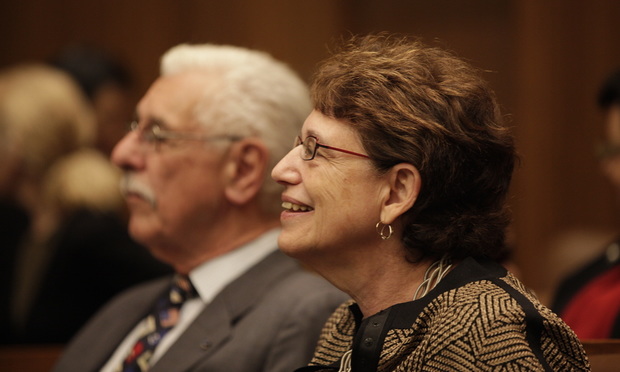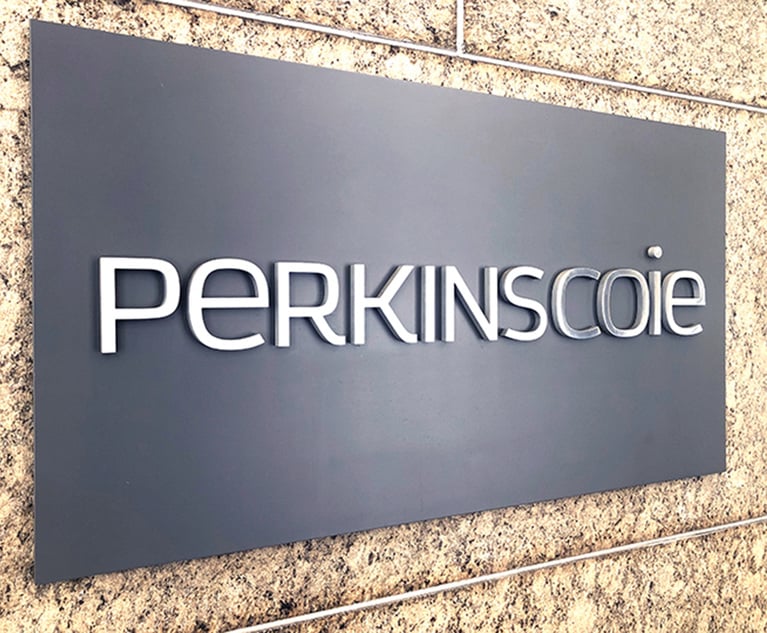9th Circuit Rejects DOJ’s Definition of ‘Safe and Sanitary’ Conditions for Migrant Children
A DOJ attorney had drawn scrutiny during oral arguments for an exchange over whether “safe and sanitary” conditions includes having a toothbrush and soap.
August 15, 2019 at 02:40 PM
4 minute read
 Marsha Berzon, of the U.S. Court of Appeals for the Ninth Circuit. (Photo: Jason Doiy/ALM)
Marsha Berzon, of the U.S. Court of Appeals for the Ninth Circuit. (Photo: Jason Doiy/ALM)
The U.S. Court of Appeals for the Ninth Circuit on Thursday ruled against the Trump administration over living conditions for detained migrant children, upholding a district court order that found federal authorities had violated the terms of a decades-old settlement dictating the treatment of the children.
Circuit Judge Marsha Berzon was pointed in the court’s opinion, finding the federal government incorrectly claimed that Central District of California Judge Dolly Gee’s June 2017 order modified the terms of the 1997 Flores settlement.
“Assuring that children eat enough edible food, drink clean water, are housed in hygienic facilities with sanitary bathrooms, have soap and toothpaste, and are not sleep-deprived are without doubt essential to the children’s safety,” Berzon wrote.
“The district court properly construed the agreement as requiring such conditions rather than allowing the government to decide whether to provide them.”
Berzon pointed to the federal government’s claim that by interpreting the settlement “to require that Border Patrol stations provide the most basic human necessities—accommodations that allow for adequate sleep, essential hygiene items, and adequate, clean food and water—the district court modified the agreement’s requirement that minors be held in “safe and sanitary” conditions that comport with the “special concern for the particular vulnerability of minors.”
“We emphatically disagree,” Berzon wrote, adding that a “cramped” interpretation of the settlement’s terms is “untenable.”
Berzon was joined by Senior Judge A. Wallace Tashima and Judge William Fletcher.
The case stemmed from allegations that the U.S. was in violation of the settlement over the treatment of migrant children detained at the U.S.’ southern border.
The terms of the 1997 agreement spell out how migrant children detained by the federal government must be treated, including that the children must be held “in facilities that are safe and sanitary” and that the minors be treated “with dignity, respect, and special concern for their particular vulnerability as minors.”
Gee had previously ruled that the federal government was in violation of the Flores settlement by keeping the minors in unsanitary and unsafe conditions at the U.S.-Mexico border.
Justice Department attorneys argued before the circuit panel in June that the terms of the settlement didn’t require them to provide specific sanitary items.
A suggestion by DOJ lawyer Sarah Fabian during oral arguments that the government didn’t have to give the children soap or toothbrushes captured national headlines.
“It’s within everybody’s common understanding that if you don’t have a toothbrush, if you don’t have soap, if you don’t have a blanket, that’s not safe and sanitary. Wouldn’t everybody agree to that?” Tashima asked Fabian. “Do you agree with that?”
“Well, I think it’s, I think those are—there’s fair reason to find that those things may be part of safe and sanitary,” Fabian replied.
“Not ‘may be.’ ‘Are’ a part,” Tashima said. “Why do you say, ‘may be’? You mean there’s circumstances when a person doesn’t need to have a toothbrush, toothpaste and soap for days?”
The Trump administration has faced intense scrutiny over its treatment of migrant children detained at the border, particularly in light of its since-terminated policy of separating immigrant families at the border.
At least six children have died in or shortly after being held in the custody of immigration officials over the past year.
Read the ruling:
Read more:
‘A Very Difficult Time’: Challenges for Career Lawyers at Trump’s DOJ
Draining the Reservoir: The Steady Erosion of Credibility at the DOJ
Sympathy for the Devil: That DOJ Lawyer Who Denied Kids Soap
Meet Dolly Gee, the Judge Who Will Consider DOJ’s Request on Family Detentions
This content has been archived. It is available through our partners, LexisNexis® and Bloomberg Law.
To view this content, please continue to their sites.
Not a Lexis Subscriber?
Subscribe Now
Not a Bloomberg Law Subscriber?
Subscribe Now
NOT FOR REPRINT
© 2025 ALM Global, LLC, All Rights Reserved. Request academic re-use from www.copyright.com. All other uses, submit a request to [email protected]. For more information visit Asset & Logo Licensing.
You Might Like
View All
Trump's DOJ Delays Releasing Jan. 6 FBI Agents List Under Consent Order
3 minute read
Judge Grills DOJ on Trump’s Birthright Citizenship Executive Order

Perkins Coie Backs Challenge to Trump's Ban on Transgender Military Service
4 minute read
Selendy Gay Files Lawsuit Challenging Trump's Workforce Reclassification EO
2 minute readTrending Stories
- 1Black Judges Discuss Growing Up During Segregation, Efforts to Diversify the Profession
- 2As They Dissolve the Firm, Equity Partners in Houston Trial Firm Hodges & Foty Dispute Over Access to Bank Accounts
- 3How I Made Office Managing Partner: 'Always Be Willing to Work Harder Than the Person Next to You,' Says Esther Cho of Stradley Ronon
- 4People in the News—Feb. 10, 2025—Flaster Greenberg, Tucker Arensberg
- 5The Support Center for Child Advocates Welcomes New Executive Director
Who Got The Work
J. Brugh Lower of Gibbons has entered an appearance for industrial equipment supplier Devco Corporation in a pending trademark infringement lawsuit. The suit, accusing the defendant of selling knock-off Graco products, was filed Dec. 18 in New Jersey District Court by Rivkin Radler on behalf of Graco Inc. and Graco Minnesota. The case, assigned to U.S. District Judge Zahid N. Quraishi, is 3:24-cv-11294, Graco Inc. et al v. Devco Corporation.
Who Got The Work
Rebecca Maller-Stein and Kent A. Yalowitz of Arnold & Porter Kaye Scholer have entered their appearances for Hanaco Venture Capital and its executives, Lior Prosor and David Frankel, in a pending securities lawsuit. The action, filed on Dec. 24 in New York Southern District Court by Zell, Aron & Co. on behalf of Goldeneye Advisors, accuses the defendants of negligently and fraudulently managing the plaintiff's $1 million investment. The case, assigned to U.S. District Judge Vernon S. Broderick, is 1:24-cv-09918, Goldeneye Advisors, LLC v. Hanaco Venture Capital, Ltd. et al.
Who Got The Work
Attorneys from A&O Shearman has stepped in as defense counsel for Toronto-Dominion Bank and other defendants in a pending securities class action. The suit, filed Dec. 11 in New York Southern District Court by Bleichmar Fonti & Auld, accuses the defendants of concealing the bank's 'pervasive' deficiencies in regards to its compliance with the Bank Secrecy Act and the quality of its anti-money laundering controls. The case, assigned to U.S. District Judge Arun Subramanian, is 1:24-cv-09445, Gonzalez v. The Toronto-Dominion Bank et al.
Who Got The Work
Crown Castle International, a Pennsylvania company providing shared communications infrastructure, has turned to Luke D. Wolf of Gordon Rees Scully Mansukhani to fend off a pending breach-of-contract lawsuit. The court action, filed Nov. 25 in Michigan Eastern District Court by Hooper Hathaway PC on behalf of The Town Residences LLC, accuses Crown Castle of failing to transfer approximately $30,000 in utility payments from T-Mobile in breach of a roof-top lease and assignment agreement. The case, assigned to U.S. District Judge Susan K. Declercq, is 2:24-cv-13131, The Town Residences LLC v. T-Mobile US, Inc. et al.
Who Got The Work
Wilfred P. Coronato and Daniel M. Schwartz of McCarter & English have stepped in as defense counsel to Electrolux Home Products Inc. in a pending product liability lawsuit. The court action, filed Nov. 26 in New York Eastern District Court by Poulos Lopiccolo PC and Nagel Rice LLP on behalf of David Stern, alleges that the defendant's refrigerators’ drawers and shelving repeatedly break and fall apart within months after purchase. The case, assigned to U.S. District Judge Joan M. Azrack, is 2:24-cv-08204, Stern v. Electrolux Home Products, Inc.
Featured Firms
Law Offices of Gary Martin Hays & Associates, P.C.
(470) 294-1674
Law Offices of Mark E. Salomone
(857) 444-6468
Smith & Hassler
(713) 739-1250








